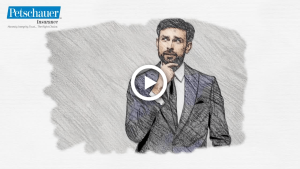Part III – 6 Reasons Why Your Disability Benefit may Not be Enough
Income Protection series: Part 3
6 REASONS WHY YOUR DISABILITY BENEFITS MAY NOT BE ENOUGH
As a valued employee, your firm offers Disability Benefits. And, congratulations for taking advantage of these benefits to protect your future income and financial security. So you can sleep at night now that you are fully covered – right? NOT SO FAST! Here are 6 reasons why your Disability Benefits may not be enough and purchasing an Individual Disability Income Policy needs to be your next step.
1. The Benefit is Capped
Long Term Disability (LTD) Benefits pay you a reduced income. This benefit is reduced in 3 ways:
1. Benefit is paid as a percentage of cash income. Example: “50% of salary”
2. Benefit is capped at a specific dollar amount. Example: “$6,000 per month maximum”
3. Other forms of compensation, such as bonus and stock awards, are often not included in the benefit calculation.
If you are a high-income earner, you will often see a significantly smaller percentage of your income covered relative to most employees, especially if your cash bonus or stock awards make up a significant portion of your total earnings.
It is also important to note if you qualify for Workers Compensation or Social Security benefits, your Employer Benefits are offset by these benefits, so you may not have any additional income from these programs.
2. The Benefit is Often Taxed
Employers that pay for the Disability Benefits can write off the insurance cost as a tax deduction; therefore, any benefit paid to you would be considered taxable income. If you pay the cost, you may be given the choice to pay the insurance cost on a pre-tax or post-tax basis. Although you may save a little by paying on a pre-tax basis, we recommend you pay your LTD Benefits on a post-tax basis so your Disability Benefit would be paid tax-free, thereby maximizing your benefit.
3. The Benefit pays for a limited amount of time
LTD Benefits will pay you up to a maximum of two years, five years or until age 65, depending on the contract. LTD benefits are not typically paid during the retirement years. Even with Disability Benefits in place, there is a significant financial strain on your household due to a decrease in income and a likelihood of significant increases in medical-related expenses. Therefore, if you are disabled, you have significantly fewer years to save for retirement and may have to dip into your savings to pay medical expenses.
4. How Disability is defined may determine whether a Benefit is paid or not.
Not all Disability benefits are created equal! You are more likely to qualify for a benefit that defines disability in terms of “Own Occupation” as opposed to a plan that uses an “Any Occupation” definition. If you get sick or injured and can no longer perform your “own occupation” then you would qualify for the benefit even if the insurance company believes you could earn money doing something else. To qualify for the latter you would have to be so disabled that you are unable to perform “any occupation.” Bottom line: you have more protection with a benefit that defines disability as “Own Occupation.” Additionally, just because your benefit starts out with a favorable definition of disability doesn’t mean it stays that way. It is common for plans to change to a less favorable definition after 2 years of paying a disability claim, which is spelled out in the insurance contract.
5. The Benefit can change.
Employers have the option to change their Benefits Package from time to time due to the market, managerial or financial shifts of the firm. Employees may find their Disability Benefits reduced or
removed altogether.
6. The Benefit is not portable.
The LTD Benefit discontinues if you change employers. Your new employer may not provide Disability Benefits or have significant differences in the benefit.
What should you do?
Give us a call! We can help you understand your Employer-Provided Benefits and assist you in regaining control over your financial security by securing an Individual Disability Policy that compliments these benefits. Individual Disability Protection is portable, tax-free, and provides income throughout an entire claim. If there is a gap in your financial protection plan, we can review options to cover your most valuable asset: YOU!
Stay tuned for next month, when we address common misconceptions people have about Disability
Benefits provided by Workers Compensation and Social Security.
To read Part II – Know What is Covered with Your Employer-Provided Disability Benefits, CLICK HERE
Mathew Kryder, the writer of this blog, is Petschauer Insurance’s Life & Disability Advisor and can be reached
at (516) 419-4266 or mkryder@jpins.com.
To request a Disability Insurance quote CLICK HERE









